I haven’t often found myself in situations where I’m the only Arabic speaker in a group of foreigners. In fact, when I’m in Jordan, I usually find that I’m either one of many, or I’m just so poor in comparison that I just clam up and let the other Arabic-speaking foreigner have at it. Not today, though! Today, I became the unofficial guide and negotiator for an entire ferryload of foreign tourists.
The train ride from Luxor to Aswan was mercifully short. It seemed to be the dirtiest train car I had ever set foot in; my ticketed seat number had two smashed and funky-smelling sandwiches crushed into my cup holder. I gingerly sat down and tried not to inhale too deeply. A man across the aisle gave me a friendly smile after watching my obvious discomfort and told me in English that I could go ahead and move if I wanted to; the car was only half full. I gratefully took his advice and moved one seat forward, almost immediately falling asleep after my long day of hiking through mountains, temples and tombs. I stayed awake long enough to remember to get out my ticket, and when I awoke three hours later in Aswan, I noted that the conductor had gingerly taken it from my hand, checked it, and then gently tucked it into my shirt’s breast pocket.
The man who had spoke to me earlier paused outside the train car and waited for me. Introducing himself as Mohammad, he asked what I was doing in Aswan. I already had a pretty good idea where he was getting at, and told him that I was looking for the so-called night military convoy and a convoy bus that could take me to Abu Simbel. Unsurprisingly, Mohammad happened to own a hotel a few blocks from the train station and offered me a place to rest for the next few hours while he arranged for me to join a convoy bus.
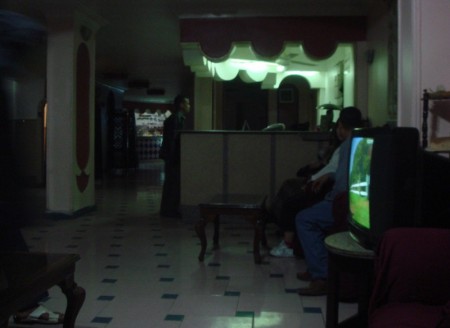
Not a bad place to spend a few hours, if you don't mind the neverending thump of bland techno below you
I spent the next few hours curled up in velveteen armchair in the dim and smoky Queen Hotel, half-asleep and drowsily answering questions from two enthralled young Egyptian hotel employees, who couldn’t decide whether me or the Arabic-dubbed Planet of the Apes movie on the television was more interesting. Finally, to distract them, I asked where the throbbing, floor-shaking music was coming from. They led me outside to a small trapdoor next to the street. Normally I wouldn’t be found crawling into trapdoors at 2 in the morning in southern Egypt, but I was too tired to think of safety precautions properly.
We came out into a room that was even smokier and dimmer than the hotel, if that were possible. It was a scene out of the various argeilleh bars in Amman, with a half-dozen bored-looking and heavily mascaraed young Arab women with long black hair were gyrating slowly on a platform at the other end of the hall. A dozen young and middle aged men were lounging at counters and smoking hookah and watching them with the same interest that one gives a fresh, well prepared salad. Heads swiveled towards me when I entered, a few people chuckled, and one or two made hand gestures for me to enter and sit by the stage. I nodded politely, then feigned having a telephone call and fled back upstairs to the relative non-sleeziness of the hotel lounge.
When the bus arrived, I paid Mohammad the 100 pounds he asked for without complaint and bored the quiet and darkened bus. As it was 4 in the morning, everyone was in that drowsy, somewhat grumpy mood you can’t help but be in after you drag yourself awake just long enough to get somewhere else. The numerous potholes in the streets of Aswan weren’t making it any easier to drift back off again.
Who should I find on the bus in the seat behind me but the two Chinese students I had met the previous day on the way down to Luxor? We sleepily commented on what a small world it was and made small talk about what we’d seen in our separate day, waiting for the queue outside the military checkpoint at the edge of town to fill up. Finally, at around 4:30, someone decided there were enough tourists to warrant the trip and all twenty buses lurched into motion.
As the hours passed, the bus slowly filled with light and I could make out more of the passengers inside. It appeared to be an even mix of Caucasian and Asian people, but I didn’t hear a single conversation in English, so I slowly guessed at the nationalities to be French and Italian. It was amusing to see everyone clutching the same Lonely Planet in their hands that I had, except in four or five different languages.
Our driver Kamal exuberantly announced our arrival at approximately 8 in the morning. “EXKEEZE ME! HELLO! MY FRIEND! MY FRIEND!” he bellowed repeatedly as he shifted into park. “WE HERE NOW AT ABU SIMBEL! YOU BACK HERE AT 9 AND FIFTY! BUS ONE EIGHT ONE!” I’m not kidding, he really did say “exkeeze.” Low muttering filled the bus; we had just been on this bus for four hours and we were being given less than two hours at the site itself? What could be done, though? We exited the bus and threaded our way through the buses to the ticket counter.
As my traveling companions and I walked up the neatly-swept asphalt path, I enjoyed breathing clean air for the first time in a week. After all these cities with unregulated pollution, I was beginning to understand that Amman is, comparably speaking, one of the modern jewels of the Arab world in that regard. Here in Abu Simbel, though, I could look down into the crystal-blue waters of the Nile, now much higher than they would have been in the time of the temple’s constructor Ramses II. One of the most incredible things about the Abu Simbel temples is that because of the rising water levels due to the Aswan High Dam, they actually deconstructed the entire site and moved it 65 meters higher, and 200 meters back. Look here for more info on that.
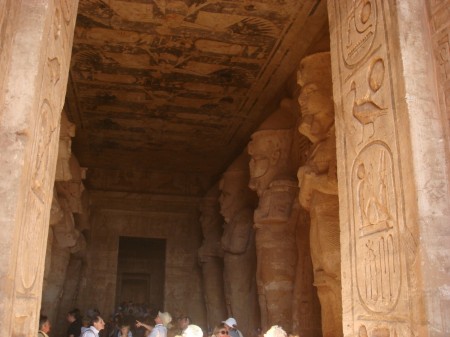
Leaning in over the doorjamb and taking pictures of the inner room is as good as photography gets in Egypt
Rounding the corner, we all gasped in appreciative awe as the three (formerly four) massive statues to Ramses II came into view, one by one from right to left. The tourists were already in full swarm mode around the fallen sandstone blocks from the destroyed statue, which for aesthetic purposes had been left in pieces during the reconstruction. I rested my hand on one of the Ramses’ giant toes and stared up into his nostrils. He didn’t seem to notice me and continued gazing into the southeast like he had been for the past 3,254 years. I’m sure that Ramses II himself would be pleased that such care was taken into preserving his largest and grandest legacy.
Both of the temples, the larger temple from Ramses to the main gods and the smaller to his wife/Nefertari, had large signs forbidding photography. After yesterday’s hassles in Luxor, I was a broken and beaten man, and I meekly kept my camera holstered as my companions and I followed the winding lines of tourists through the yellow, lamp-lit corridors, etched with thousands, if not millions, of hieroglyphs and pictures depicting Ramses in all his triumphant glory. The main room had more statues to the pharaoh, but the side rooms had apparently been used for storage, possibly for tribute to the king from the conquered Nubians to the south. The temple definitely seemed to showcase Ramses’ god-like power over his subjects, but also his sensitive side and his wish to be pleasing for the gods. You’d probably need to be an Egyptologist to figure out the subtle differences between what made this a temple versus a tomb, though.
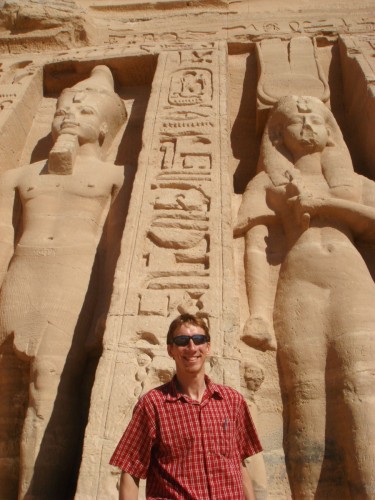
Proportionally speaking, I'm about at the right height (slightly below knee level) to be one of the prince statues
The nearby temple of Hathor was a gift from Ramses for his favorite wife, Nefertari. Scholars have always shuffled between calling it Hathor’s temple or Nefertari’s temple. Basically, in the same way that the pharaoh got to be a representation of a god here on earth, that means his wife often was portrayed as one as well, and Hathor was a favorite. The carvings and reliefs on these walls were even more interesting than the standard “tribute-giving” etchings in the larger and more famous temple. Here it showed Ramses and his wife giving each other flowers, Nefertari worshipping the gods, and all kinds of cute love scenes, like the two of them in a boat on a trip down the Nile. The books are quick to point out that Nefertari must have indeed been a special favorite and companion to Ramses, because it’s one of the few places where a pharaoh carved representations of a woman at the same height to himself. The picture above shows Ramses on the left, and Nefertari on the right, with her Hathor-style headdress.
Time was running out, and my three main companions – Carol, Chen, and Kenji – took our last few minutes to back up as far as we could, all the way to the chain-link fence at the edge of the hill, so we could take in the full magnitude of the temples, now being lit in full brightness by the late morning sun. Behind us, the water lapped gently against the green reeds on the shore. Somewhere directly below us, now deep underwater, was the original and ancient construction site that Ramses II had gazed upon and regally proclaimed his pleasure at his edifices.
Kamal was glancing at his watch when we returned, and started the bus moving before the last Chinese tourist had even gotten both legs into the vehicle. I had come to expect it from my past week in Egypt, but several other people looked mortified at this. Kamal happily shouted “EXKEEZE ME!” at us, and announced that we would be making a brief stop at the Aswan High Dam. Some of the Italians looked a little bored by this prospect, and three quarters of them elected to stay behind, literally waiting on the curb, when we arrived at the dam after the 3 hour return trip.
Kamal went about collecting the 20 pound fare from everyone. I asked him, in Arabic, exactly what there was to see at the dam. He stared at me, agog, and asked me where I learned to speak Arabic. I patiently explained the same story about my work and life in Jordan that I’ve told probably three times a day for the past year and a half, albeit in abridged form. There’s a museum, he told me. What he neglected to mention is that we wouldn’t be visiting the museum. No, we merely exited the bus in the center of the huge dam, surrounded by several other groups of somewhat skeptical, bewildered tourists who all seemed to be silently wondering – we paid $3.75 apiece to stand on a dam with a road already going over it? I looked at the swollen artificial body of water, Lake Nasser, on one side, and walked to the other, and looked at the tiny Nile River that would eventually stretch all the way up to delta I’d seen a few days earlier. “TEN MINUTE” bellowed Kamal from somewhere over to my left, and I saw the bus parked under the shade of a tall, obviously transplanted tree in the middle of the median. And that was it. When we picked up the Italians, who had been sunning themselves in the parking lot, I told them dryly that they had probably made the wiser choice. But Kamal and his fellow bus drivers had a captive audience. Who knew how much things actually cost when you have a driver to collect it for you?
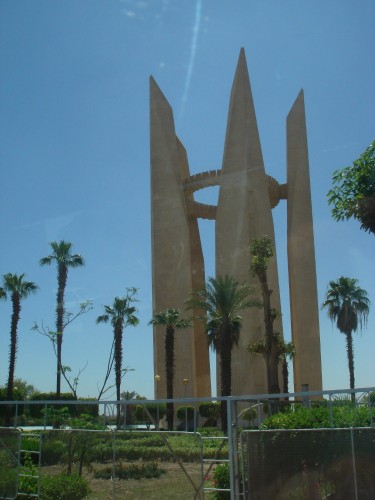
What are these massive spires next to the dam? Who knows; you'd have to convince Kamal to actually stay at a place for longer than 10 minutes
The final stop is where things got interesting. Kamal kept throwing me little grins in the rear view mirror, as if he and I now shared some sort of magical secret that comes from being able to speak poorly-pronounced Arabic. Within another twenty minutes, we had arrived at the parking lot for the Island of Philae, which judging by the travel book seemed like a pretty interesting place. The other tourists had heard me talking with him, and some of them were now throwing me a few extra glances. I hadn’t showered since Alexandria though, and they really could have been looking at me for any number of less-than-flattering reasons. I focused on trying to stay as unnoticeable as possible.
No luck, though. “EXKEEZE ME!” cried Kamal, slapping me on the back. “Translate for me, brother,” he asked me in an aside. The two of us explained to the group that we would have an hour and a half to take the ferry over, see the Island and temple, and return. “No, two hours,” I grunted at him, and asked the little crowd what they’d prefer. Mutinous chatter in Chinese and Italian was unintelligable to Kamal and myself, but he got the drift. “Okay good good! TWO HOUR!” he agreed. He told me to talk to the traffic officer at the nearby ticket booth when we returned, who would radio him to come by with the bus.
Suddenly, I found myself leading the busload of tourists. For better or for worse, I had been unofficially nominated as the “guide” for the group. Getting the tickets to the island itself was easy, as it was managed by the Egyptian Tourism Authority, but then all hell broke lose when we were directed to the dock, filled with little long ferryboats and lounging dark-skinned captains who sauntered forward toward us with a confident air. The last thing a tourist wants to see is a vendor with that confident smirk on his face.
Carol explained to me that when she had come to Egypt previously, the ferryboat had been 5 pounds per person for the round trip. “That was two years ago, though,” she trailed off. I counted up our little band of tourists, and matched the lead captain’s confident and firm handshake with one of my own. This was going to be interesting.
“Generous master of the ferries,” I began. “What price would you give to 20 people in a group?” The captain’s jaw slacked slightly, and he turned over his shoulder to look back at the others, who had broken into amused smiles at my flowery, obsequious wording. “15 guineas per person,” replied the captain, using the native Arabic word for pound. I spread my hands and smiled innocently. “My dear friend, this is triple the regular price. This is a large group. Five per person would be suitable, right?” The other captains broke into outright laughter at that. The lead captain refused to budge on the price, and I explained the situation to the rest of the group. “Prices go up,” shrugged the captain. “Next year it will be 20. That’s the way it works.”
By now, several other tourists I didn’t recognize had come up to see what was going on, and everyone was looking at me expectantly. “Is there anyone who would take us for lower? Eight guineas per person?” I called out to the men behind the captain. One bearded man nodded slowly, and the other captains shrugged and turned away. The captain called forward a man about my age, who introduced himself as Mahmoud, and said he’d be the ferry pilot for us at 8 pounds per person. Cheered immensely by this, I translated my moderate success to the rest of the group, and suddenly found myself ushering in everyone onto the boat, including another ten people I’d never seen before. It seemed that word of my little price-negotiations had spread and the boat was soon completely full to its safe limits. “No more,” I firmly told Mahmoud, who had little pound-signs appearing in his eyes. “It’s not safe to fill up this boat any more.” He laughed. “How long will your group stay on the island, Oh Pasha?” I told him what Kamal and told me, and the engine came to life with a feeble cough that made me glad I’d forbidden anyone else from joining us.
As I took my seat, I heard a chorus of “thank you” rise from the seated people, and I coughed awkwardly and pulled my hat down tighter over my greasy hair and told them that I wished I could have done a little better. An American next to me shook my hand and told me they’d tried to charge him and his family 100 pounds for the entire thing so he was more than happy to be on this ferry instead. Several other Europeans asked me where I’d learned Arabic, and I dutifully explained again what I was doing in this part of the world. I made sure that everyone knew what time we needed to be back, and hearing no arguments, clapped Mahmoud on the back as we disembarked and told him we’d be back soon. He pulled out his pack of cigarettes, held them up, and said he’d keep himself busy while we were gone.
The temple of Isis was one of my favorite parts about Egypt so far. Relatively few tourists, surrounded by beautiful tropical wildflowers and palm trees, and with plenty of destroyed ceilings to let light down into the dusty chambers to illuminate the hieroglyphs on the walls. Having the good companionship of my new friends helped too. As I spent the next hour wandering about the temple complex, everyone would smile and wave at me. One of the Asians on the trip cried out to me, “Hero, Zach!” I chuckled modestly, but when another asked me where I “rearned” Arabic, it occurred to me that perhaps I wasn’t being hailed with grand superlatives after all.
Almost all of the temple’s majestic carvings of Ptolemy and Isis had been desecrated, hammered and pounded at with chisels until all the walls contained were cartoon-like punched out shapes of the Greek “pharaoh” and his homage to the goddess. Apparently, early iconoclast Christians and later, the even more iconoclastic Muslims decided that this Island was going to be a target, being that it was relatively easy to find compared with the hidden tombs of the Valley of the Kings or the still-buried Abu Simbel temple complex.
Surprisingly, every single one of my fellow ferry-riders had arrived back at the dock at exactly the time I had specified. Not a single one was late. I guess I’ve been in Jordan too long that I find punctuality shocking. Mahmoud had made it halfway through his pack, and I was able to wear him down to another half price for the two children on the boat too. The amount of nicotine in his system was probably making him more agreeable than usual.
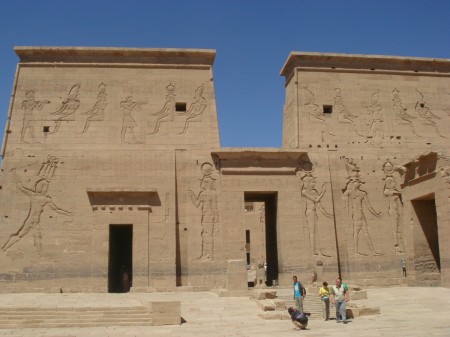
If you look closely, you can see the difference between the destroyed carvings on the left, versus the intact on the right
Kamal drove us all back into the city. “EXKEEZE ME MY FRIEND! Outside is archeological site for large base!” he cried out to us on the outskirts of town, next to a pile of rubble. He beamed at us as if he had delivered us to the pyramids, and we collectively grunted “uhhnnh.” It had been a long, 11 hour day that started very early, and no one wanted to move from our slumped-over positions in our comfy seats. We declined Kamal’s offer to drop us off here and instead everyone just wanted to be taken back to their respective hotels. I learned that the Asians had come from one, and the Italians from another. I was the only person who had joined after the fact, and had apparently tipped Mohammad an extra 20 pounds for his work in getting me on the bus.
For lunch, my Asian companions invited me to join them at a little restaurant that they had found yesterday when they arrived in Aswan in the late afternoon. As none of them spoke any Arabic at all, I asked them how they had found the place and knew what to order, as it certainly didn’t have any menus or such. They pointed to a sign by the door that had writing in Japanese, Korean, and Chinese apparently describing a 12-pound chicken special. It was spicy – extremely spicy – but delicious. My companions seemed shocked and enthralled, watching me use the tough and chewy corn-based pita bread to scoop up the food, and tried to emulate. An old man and his wife, a teacher, enthusiastically thanked me to coming to Aswan and told me that I was doing God’s work as a teacher back in Jordan.
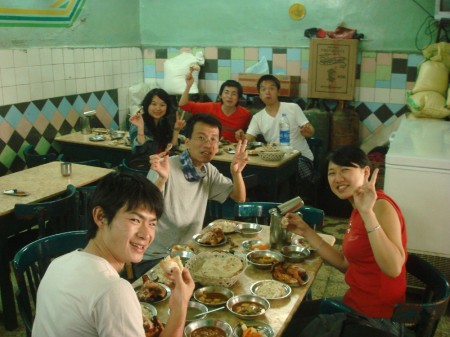
With tourists from Taiwan, Japan, and China in our group, English became our universal communication tool over lunch!
My train to return me to Cairo was scheduled to leave at 7 in the evening, but I had time to join my friends for an hour out on the Nile, gliding about in one of the famous white-sailed felucca boats. As we were leaving the restaurant, a robed and grizzled man with a turban sidled up next to us and conveniently asked us if we wanted to join him on his boat, which he may have even heard us discussing moments earlier. He introduced himself as Fati, and he and I spent the next ten minutes haggling over times, locations, and prices. He was amiable to our end price of 16 pounds per hour per person, and took us out to the river, where his felucca bobbed gently, surrounded by its fellows, and he quickly and skillfully untied its ropes and pushed us out into the river before hopping in himself.
As Fati expertly used one hand to twist the ropes next to him to unfurl the sail into the wind, and the other to man the steering column, he explained to him that he’d been piloting feluccas for 40 years. My companions snapped pictures and marveled at the huge palm trees on the islands we were floating past. Fati and I sat in the back, and he pointed out his friends in their own boats all around us. “I’ve been racing him since we were your age. He hasn’t won a single time!” he laughed. “That one over there; he once needed to tie his felucca to mine after his mast broke and I brought him back to the beach.” He had a lot of stories, but I was getting tired by this point and I was only able to mentally translate a fraction of them.
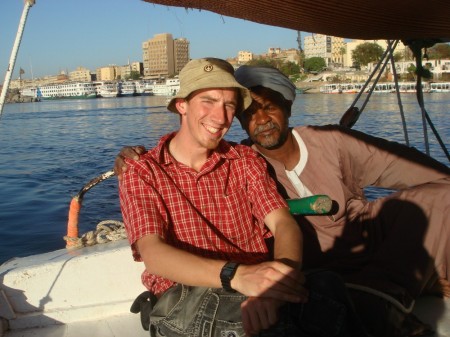
Compared with Fati, I had a lot of difficulty keeping my eyes open long enough for Carol to take the picture!
As we rounded the corner of the large Elephant Island, the wind died suddenly and Fati took matters into his own hands, literally. He passed the rudder into my hands and grasped two huge pieces of wood that we hadn’t noticed before, and I realized that they were crude oars. Without the usage of oarlocks, he grunted and flung himself forward, pulling the boat roughly through the water. For such an elderly-looking man, he proved his racing prowess and he called back to me that he wanted to be sure I wouldn’t miss my train. The sun was setting to our left as we headed north, back down the river, and the city of Aswan was bathed in golden light to our right. Strange animal cries came from the darkened trees in the islands around us, or I suppose it’s just as possible they were partying Egyptian men, too.
We reached the shore slightly after the sun’s last light vanished behind the mountains on the far shore of the Nile. We paid Fati and returned to the center of town, where I exchanged email addresses and business cards with everyone so we’d be able to exchange pictures later. I had just enough time to run across the street, grab a pizza from a local place that was recommended in my book, and jump on the train.
I settled down with a happy sigh in the first class compartment, stretched my legs out, and listened to the sound of the shouting conductors outside. The car was air conditioned, clean, and with pleasant dim lighting that just demanded me to drift off to sleep. It would be another 14 hours until we reached Cairo, and I was looking forward to a shower and a bed more than ever before!
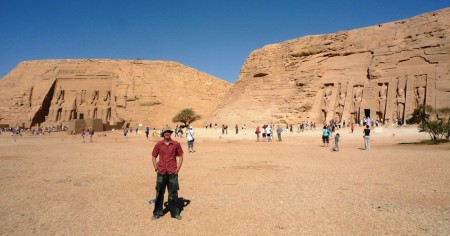
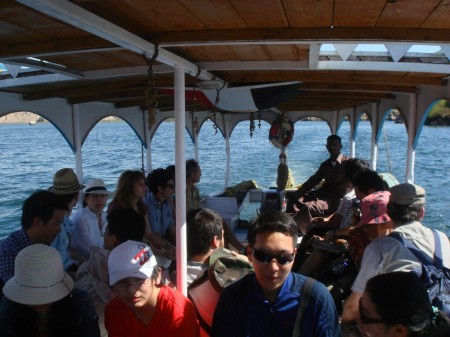
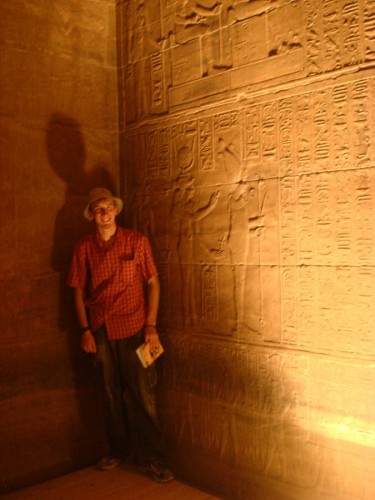
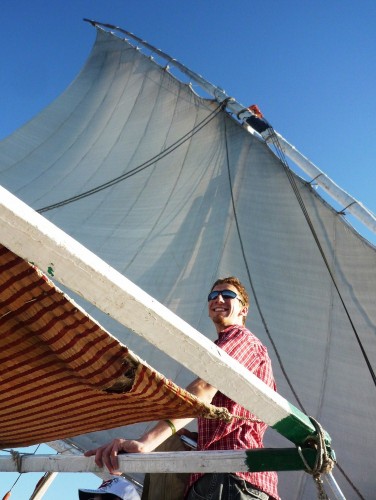
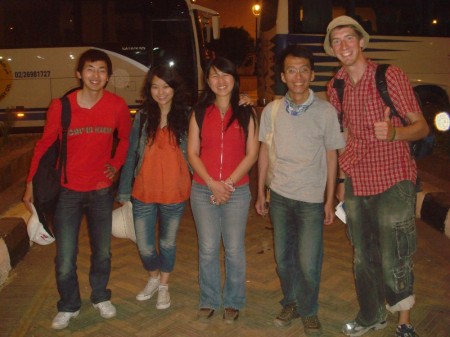


So no time to actually do the tourist thing in Aswan?
I guess it seemed like I was fairly touristy while I was in Aswan…why, what do you mean?